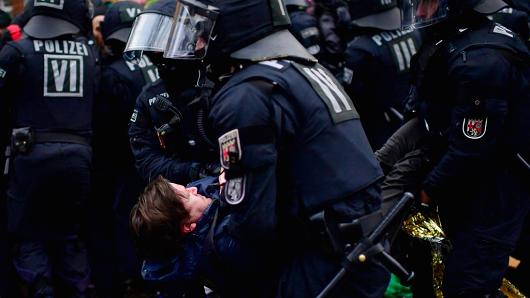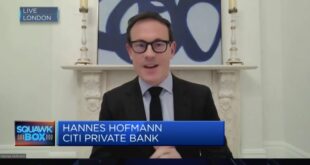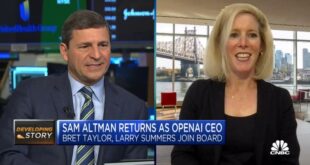
Alexander Koerner/Getty Images
Left-wing protesters clash with police forces outside the Hannover Congress Centrum (HCC) prior to today’s AfD federal congress on December 2, 2017 in Hanover, Germany. The AfD won 12.6% of the vote in German federal elections last September, making it the first right-wing party to win Bundestag seats.
Germany’s anti-euro, anti-immigration Alternative for Germany (AfD) party appeared to take a lurch further to the right at the weekend, with party members electing a hardline nationalist as co-leader of the party and eschewing more moderate candidates.
During the AfD’s first party congress since German elections in September — which saw the party gain enough votes to enter parliament for the first time — delegates elected Alexander Gauland to co-lead the party along with Jorg Meuthen.
Gauland replaces Frauke Petry who shocked many by quitting the party after its election success to become an independent member of parliament. The move disappointed more moderate members who had hoped to elect Georg Pazderski, leader of the AfD’s Berlin branch.
The election of Alexander Gauland, who has courted controversy for various remarks relating to World War II, seems to cement the party’s move towards the right. However, speaking to CNBC on Monday, moderate candidate Pazderski denied this.
“I think we had a good result (at the congress). It’s not a move to the right and now I’m number three in the party and before I was not in the top leadership. And the board of the party is now a very moderate party board because a lot of people have been elected to it that share my view of how the party should be developed in the future,” he said.
The AfD was founded in 2013, largely as a oppositional response to euro zone bailouts at the time, but it has gradually changed into more of an anti-immigration party particularly during Europe’s migration crisis which started in 2015.
Over one million refugees and migrants arrived in the country in 2015 alone, largely thanks to Chancellor Angela Merkel’s decision to open up the country amid the crisis.
While Germany was largely praised for its response to the crisis, many Germans have decried the decision, leading to a boost for the AfD. The party did well in the September election winning 12.6 percent of the vote, making it the third-largest party in the German parliament.
At the party congress this weekend, AfD members were shown a video which portrayed Germany as a country overrun with Muslims, stone-throwers and beggars, Reuters reported. Padzerski denied that the party’s main message was one of protectionism and anti-immigration.
“This is not the main messaging, What we say is that we have a migration crisis. If you look at Germany, we took almost 2 million people within two years in Germany and there’s something going on which is not really healthy because we have a lot of problems in Germany, we have a lot of problems in Europe. We have a crisis in the euro, in the European Union, and we have a lot of problems in Germany in the education and security systems,” he said.
“We say we have to change something. We have to stop the migration because we can’t solve the problem in Europe,” he added.
 EU News Digest Latest News & Updates
EU News Digest Latest News & Updates


